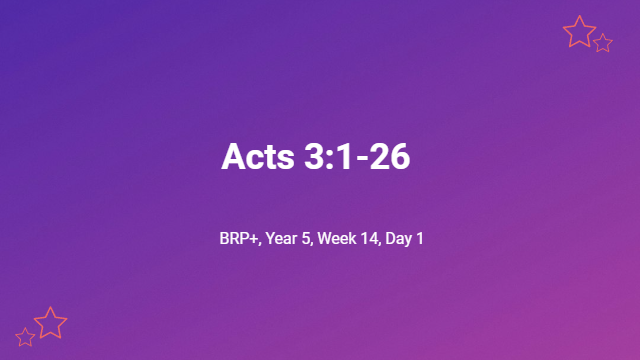Acts 3:1-26
Q.1. What was the man in the story doing at the temple gate? What was unusual about Peter’s response to the lame man? How did his excitement impact the crowds? – (Acts 3:1-10)
The blind beggar was at the temple for a very different reason from that of most of the Jews who were attending – the hour of prayer … a man who had been lame from his mother’s womb was being carried along, whom they used to set down every day at the gate of the temple, which is called Beautiful, in order to beg alms of those who were entering the temple (Acts 3:1-2). From the outset, Peter took command and asked the beggar to focus on them. However, rather than give the customary alms, – Peter said, “I do not possess silver and gold, but what I do have I give to you: In the name of Jesus Christ the Nazarene–walk!” (Acts 3:6). He then healed the man. This man not only walked for the first time in his life, but – with a leap he stood upright and began to walk; and he entered the temple with them, walking and leaping and praising God (Acts 3:8). The people knew the beggar well – … and they were filled with wonder and amazement … (Acts 3:10). The miracle was astounding enough. However, for Peter to perform the miracle in the name of the risen and glorified Jesus, the Nazarene, was staggering. It needed further explanation.
Q.2. On Whom did Peter want people to focus on following the healing? What did Peter tell the crowds about Jesus? How did he explain the man’s transformation? – (Acts 3:11-16)
What Peter did next was in stark contrast to what many modern day ‘healers’ do. Peter didn’t start a healing ministry or call on people to bring the sick and dying. What did he do? He preached the gospel and placed the focus entirely on Christ Who had orchestrated the miracle for that purpose. He started his presentation by pointing them to the prophetic Scriptures, and their recent rejection of the Saviour – 13 The God of Abraham, Isaac and Jacob, the God of our fathers, has glorified His servant Jesus, the one whom you delivered and disowned in the presence of Pilate, when he had decided to release Him. 14 But you disowned the Holy and Righteous One and asked for a murderer to be granted to you, 15 but put to death the Prince of life, the one whom God raised from the dead … a fact to which we are witnesses. 16 And on the basis of faith in His name, it is the name of Jesus which has strengthened this man whom you see and know; and the faith which comes through Him has given him this perfect health in the presence of you all (Acts 3:13-16). Though the Prince of Life had been put to death, He was still very much alive and active in the world He had made.
Q.3. How did Peter support his message about Jesus Christ? How could the crowds enter into God’s blessing? Who were candidates for the promised blessings? – (Acts 3:17-26)
Though Peter held the Jews responsible for disowning the holy and righteous Saviour, he explained – the things which God announced beforehand by the mouth of all the prophets, that His Christ would suffer, He has thus fulfilled (Acts 3:18). God, in His sovereign wisdom, had achieved His plan, notwithstanding their guilt. He further explained that their Messiah would usher in a time of refreshing and restoration for Israel (see Acts 3:19-21). However, as part of God’s intervening program, Jesus was first taken to Heaven. They could enter into His blessing and mission, but firstly they must – 19 repent and return, so that your sins may be wiped away, in order that times of refreshing may come from the presence of the Lord; 20 and that He may send Jesus, the Christ appointed for you (Acts 3:19-20). Peter then supported the gospel by quoting Moses and telling them that from the prophet Samuel and his successors onward, the Abrahamic covenant was constantly confirmed – It is you who are the sons of the prophets and of the covenant which God made with your fathers, saying to Abraham, `And in your seed all the families of the earth shall be blessed.’ For you first, God raised up His Servant and sent Him to bless you by turning every one of you from your wicked ways” (Acts 3:25-26). The gospel is global and therefore, for all people everywhere. Nevertheless, it started historically with Israel. on the Day of Pentecost (Acts 2:1).

